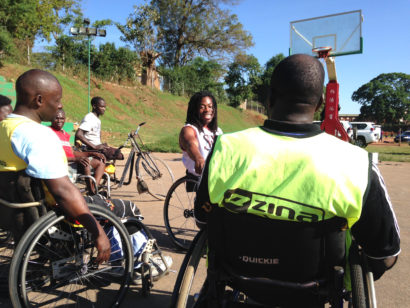Helpdesk Reports
The report begins by addressing the challenge of defining disability. It is recognised that there is variation in the nature and severity of disability, and that no single description is adequate to define it (Mont 2007; DFID 2015). Despite this challenge, the definition the UN Convention on the Rights of Persons with Disabilities (UNCRPD) (2006)… Read more
The last decade has witnessed renewed interest in the social benefits of higher education, with recent research suggesting that universities have a role in nurturing developmental leaders who enable positive change and better governance in low-income and conflict-affected countries (Brannelly et al, 2011b). This review summarises available evidence on the relationship between higher education, developmental… Read more
Formative assessments, also known as classroom assessment, continuous assessment or assessment for learning, are those carried out by teachers and students as part of day-to-day activity (Clarke, 2012a). There are multiple interpretations of formative assessment, but most literature takes the broad definition offered by Black and Wiliam (1998, cited in Pryor, 2015: 208): “encompassing all… Read more
The most common adverse effects that children who grow up in residential care experience include: developmental delays; behavioural problems; attachment disorders; lack of life skills; institutionalisation; and difficulty forming and maintaining healthy relationships. The literature is extremely clear that residential care should be a last resort for children separated from their parents, following family support,… Read more
This report undertakes a rapid review of some recent, high quality syntheses and reports to summarise the evidence on the effectiveness of different types of non-state schools in reaching the marginalised and providing quality education to them. Non-state provision has risen dramatically over the last few decades especially across South and West Asia and the… Read more
This five day rapid review looks at the experiences globally of civil society organisations providing or supporting accountability mechanisms in cash transfer programmes. Bhargava and Raha’s (2015: 12) review of civil society engagement with cash transfer programme accountability found only few studies, suggesting to them that there is a significant knowledge gap. A mixture of… Read more
This Helpdesk report has been commissioned to help understand the extent to which the education system currently meets young people’s needs and how far the school represents a safe space for young people. In line with the plan to gather insights and identify trends, themes and areas for discussion for policy meetings about the wider… Read more
People with disabilities have been found to ‘form one of the most socially excluded groups in any displaced or conflict-affected community’ (Pearce et al, 2016: 119). They may have difficulty accessing humanitarian assistance programmes, due to a variety of societal, attitudinal, environmental and communication barriers, and are at greater risk of violence than their non-disabled… Read more
Social norms are informal rules and shared social expectations that shape individual attitudes and behaviour (Arias, 2015; Marcus and Harper, 2015). Gender norms are social norms that relate specifically to gender differences. A common gender norm, for example, is that women and girls will and should do the majority of domestic work (Marcus and Harper,… Read more
‘Modern slavery’ encompasses a variety of situations in which one person is forcibly controlled by one or more others for the purpose of exploitation (Cockayne, 2015). ‘Forced or compulsory labour’ is defined by the ILO Forced Labour Convention as ‘all work or service which is exacted from any person under the menace of any penalty… Read more
This report focuses on the impact of school health programmes. School health programmes can cover both the prevention and treatment of disease and malnutrition in a school setting (Snilstveit et al 2016). These services are designed to promote students’ physical, cognitive, and social development. Effective school health programmes are broadly considered to be cost-effective. They… Read more









